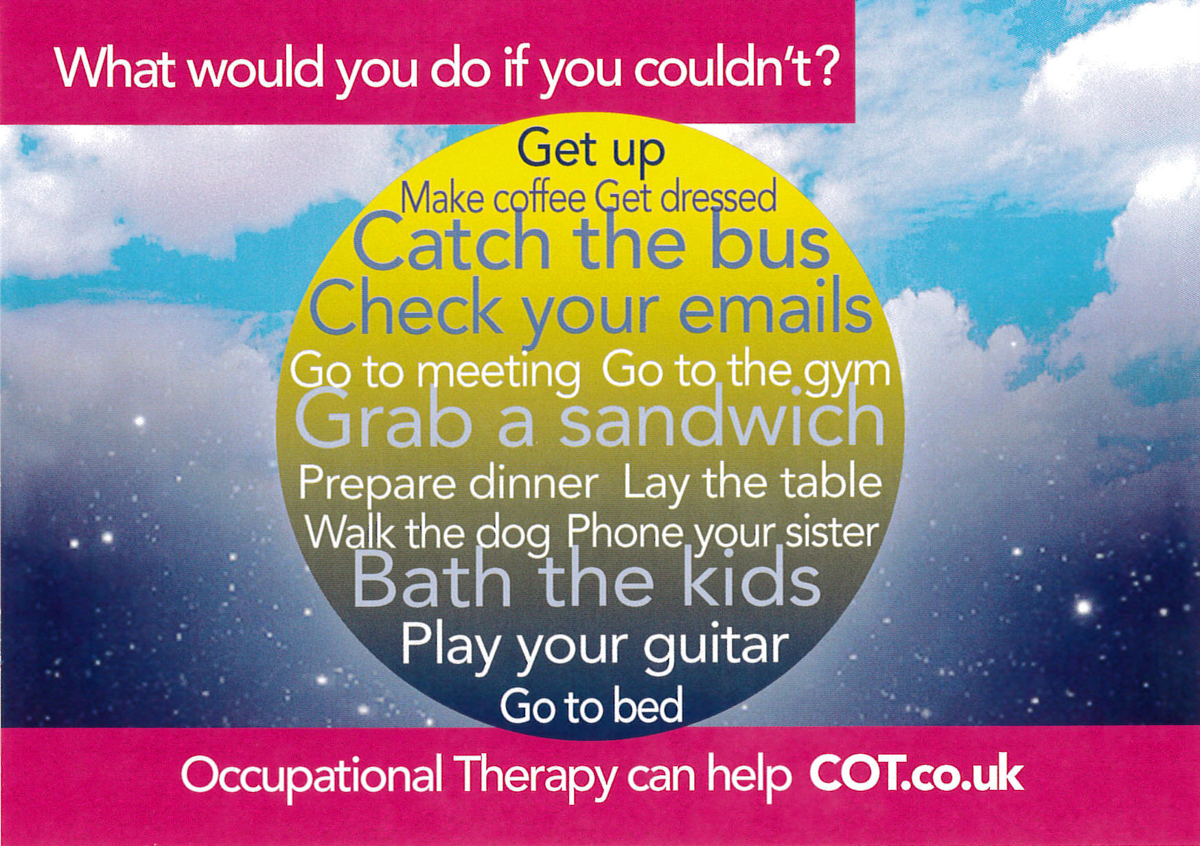Seeking better patient outcomes: Music to the ears of occupational therapists
by Allan LEONARD
11 November 2016
The College of Occupational Therapists (COT) held a launch event at the Long Gallery of Parliament Buildings, for their campaign on the value of occupational therapy, “Improving lives, saving money”.
The event was sponsored by Claire Hanna MLA, who apologised for being unable to be present.
Karin Bishop (Assistant Director, Professional Practice, College of Occupational Therapists) welcomed the several dozen attending, and displayed their fresh report, “Reducing the pressure on hospitals”.
She explained that the origins behind their campaign was their own value of providing high quality care amidst challenging financial circumstances in the health and social care services.
Bishop said that there is much good work taking place in Northern Ireland, and now occupational therapists (OTs) relieve pressure at the front door (by keeping hospital admissions low), the back door (by taking steps to prevent readmissions), and through the hospital itself (by getting patients out as quickly and safely as possible).
She encouraged us to read the square leaflet left on our seats, of the six key recommendations of their report.
The first of several intermission videos was shown; Emily’s story was one of re-enablement after a fall down stairs left her with broken wrists and limbs. (I was surprised to see her stairwell not subsequently fitted with a double rail.)
Dr Sean McGovern (Clinical Director of Emergency Medicine, Ulster Hospital) described hospitals as like airplanes: “Everyone’s been on one, but like airplanes, not everyone knows how to fly one.”
He presented a series of slides with key points, such as demonstrating that Ambulance and Emergency (A&E) pressures in Northern Ireland “are not special; there are real pressures here across these islands”.
McGovern said that based on his experience, the number of patients awaiting admission to hospital far outweighs the number of “inappropriate attenders” at A&E. He said that setting a target of a 4-hour assessment for someone who shows up at A&E, while at the same time advising people not to go to A&E if they can avoid it, is a confused message.
He also said that patient discharge from hospital into community support should involve patients and their families from day one in its planning.
Eddie Lynch (Commissioner for Older People for Northern Ireland) gave an overview of his organisation and its powers.
He highlighted changing demographics — a forecast of a significant increase in the number of older people living independently — and called for a plan to prepare for this.
Slippers matter! Lynch said that he was surprised to learn that a third of falls in Scotland are attributable to worn out or ill-fitting slippers: 120,000 falls are caused this way.
Paula Bradley MLA (Chairperson of the Health Committee, Northern Ireland Assembly) praised the COT report and its timeliness, “because Allied Health Professionals will provide a key role in realising the recommendations from the Bengoa Report”.
Bradley reflected upon her working experience as part of a social work team in Antrim Hospital. She described OTs as invaluable colleagues in assessing the needs of patients and discharging them from hospital: “We needed to work together and we did work together.”
“We do good work, and we need to replicate it all of our [Health] Trusts,” she added.
Bradley finished by saying that she looked forward to those who will come forward and give evidence at the Health Committee, in order to inform and influence the Minister of Health’s actions.
Dr Patricia McClure (Chair of Council, College of Occupational Therapists) said that there are 31,000 members in COT across the UK, with 1,000 members in Northern Ireland.
She described the uniqueness of occupational therapy, as understanding the significant impact that occupations have for people — getting out of bed, eating food, getting out, doing the hobbies and jobs that we love to do: “These are all things we take for granted until we can’t do them.”
McClure said that the Health Minister’s declared mission of “person-centred care” is “music to the ears” of OTs, as is the focus away from action targets, towards patient outcomes.
She called for a greater appreciation of the contribution that Allied Health Professionals make, and a critical role they can play in achieving long-term goals of improving health and social care.
Catherine McLaughlin (Chair, Northern Ireland Board, College of Occupational Therapists) closed the event by expressing a desire to work in collaboration and partnership: “We want to work for change, and change is pushing itself towards us.”
Afterwards, I spoke with Kate Lesslar (COT), who asked me what I thought of the event. I replied that it was good for what it was, but that the emphasis was overly about older service users, and did not feature anyone returning to work, which is another way of demonstrating “improving lives, saving money”. Lesslar took this on board, and advised me that there will be a forthcoming COT report that addresses re-employment.
There is no denying that occupational therapy improves lives and saves money. I look forward to learning more about how this benefits a broader spectrum of individuals.
@BAOTCOT
#ValueofOT
@SMG_CEM_NI
@PaulaBradleyMLA
@ClaireHanna
Originally published: https://mrulster.org/2016/11/15/seeking-better-patient-outcomes-music-to-the-ears-of-occupational-therapists-valueofot/
Peacebuilding a shared Northern Irish society ✌️ Editor 🔍 Writer ✏️ Photographer 📸 https://mrulster.com
Discover more from Slugger O'Toole
Subscribe to get the latest posts to your email.








